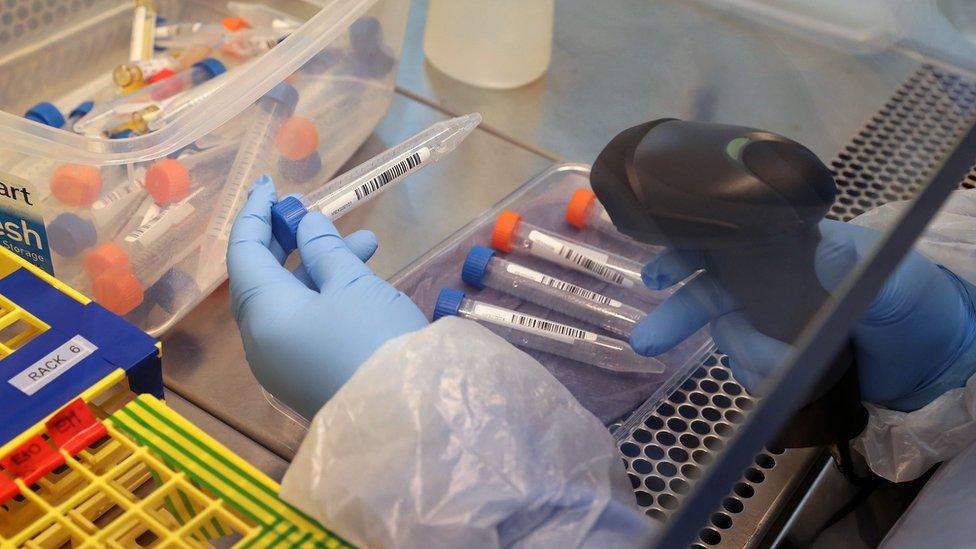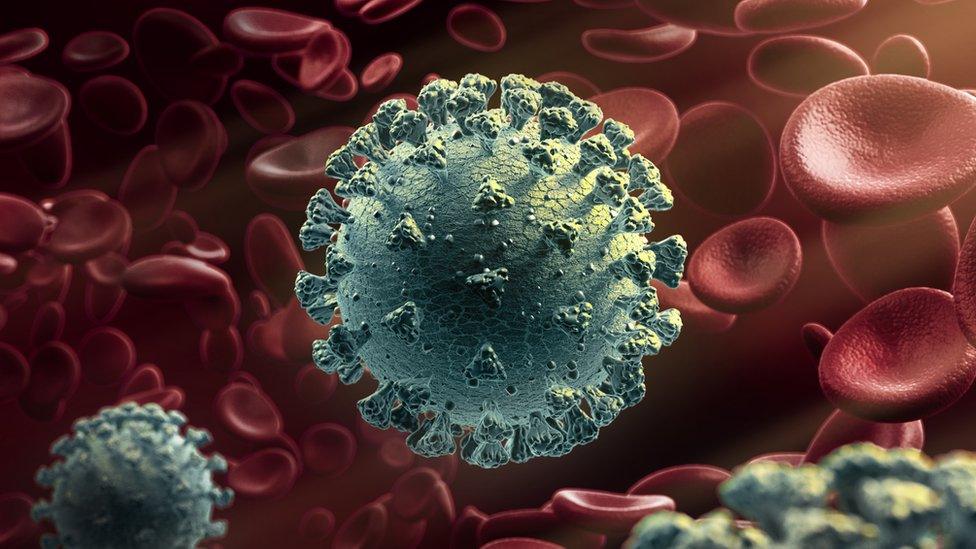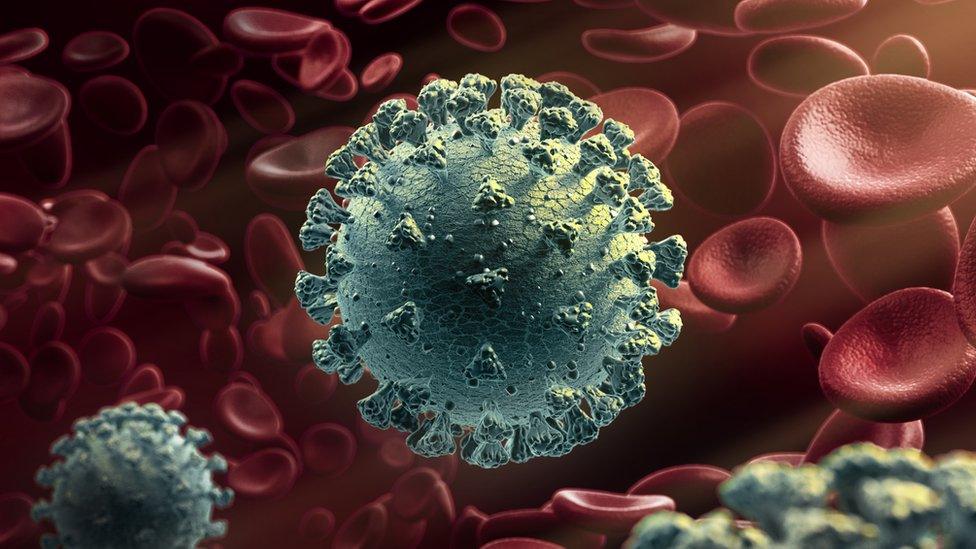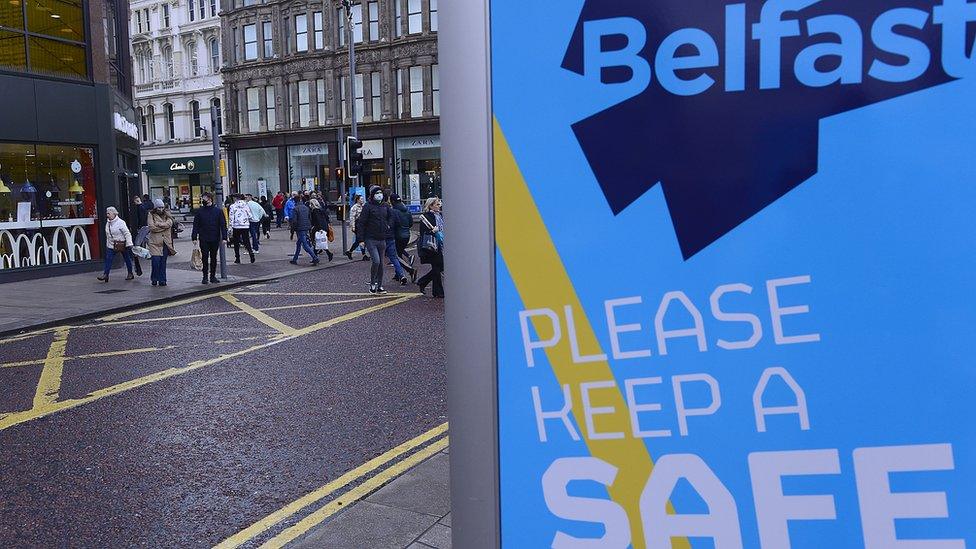Covid-19: NI testing for new coronavirus variant 'limited'
- Published

Testing for the new variant is limited in Northern Ireland
Northern Ireland is testing for the new coronavirus variant but capacity is limited, BBC News NI understands.
The "English" variant is thought to be about 50-70% more infectious than the original Covid-19 strain that emerged early last year.
It is thought that up to 50% of current Covid-19 cases could be related to the new variant.
The variant was first detected in Northern Ireland in December 2020.
On Sunday, the Department of Health reported 14 more coronavirus-related deaths, bringing the NI total to 1,730.
Another 433 people have tested positive for Covid-19.
Nightingale expands ICU
There are 796 people in hospital in Northern Ireland with the virus, 74 of them are in intensive care and 54 are ventilated.
In the past 36 hours, the Nightingale Hospital - based in the tower block at Belfast City Hospital - has opened eight additional ICU beds, in response to the number of people needing care for Covid-19.
Some patients are being transferred from other hospitals, as are staff.

The new Covid-19 strain was detected in December
Testing for the new variant is crucial in identifying clusters. It involves a process called Whole Genome Sequencing (WGS) - a detailed and complex analysis system requiring specialist equipment.
While Belfast laboratories, including those at Queen's University, are conducting tests, BBC News NI understands that this is only in a small proportion of cases.
Experts in the field have told BBC News NI that it is widely accepted that Northern Ireland is on the "back foot" when it comes to detecting the new strain and that officials would support an urgent expansion of the service.
Such testing helps identify outbreaks and clusters faster, allowing hospitals and care homes to lock down more quickly.
Concerns were raised in December as the new Covid-19 strain was detected after sampling just a small proportion of tests.
On Saturday, Taoiseach (Irish Prime Minister) Micheál Martin said that it was his "understanding" that Northern Ireland was not testing for the new variant.
'Unfair to dedicated staff'
However, the Department of Health in Northern Ireland said this was not true.
In a statement released on Sunday, it said the Regional Virus Laboratory (RVL) had reported over 200 genome sequences and that it is likely to increase its throughput to over 300 sequences next week and over 400 the following week.

Micheál Martin made the comment to RTÉ on Saturday
"At present the UK, including NI as part of the COG-UK Consortium, is carrying out 40% of all global whole genome sequencing and is submitting its data... to share with other countries," the statement read.
The statement said that whole genome sequencing has been in place from an early stage of the pandemic and to suggest NI is inactive in this field "would be wholly incorrect - and is unfair to the dedicated, expert local staff working intensively in this area".
The Republic of Ireland uses WGS at the National Virus Reference Lab at University College Dublin (UCD).
The Irish Coronavirus Sequencing Consortium also has testing facilities in some of the larger hospitals and universities.
On Sunday, the Irish Department of Health reported an additional 23 Covid-19 related deaths in the Republic, bringing the country's death toll to 2,970.
It also recorded a further 1,378 confirmed cases of the virus, taking the total number of cases to 186,554.
Virus mutation
The new variant could be increasing the death rate by up to 30%.
With the original virus, for every 1,000 cases, 100 people will be admitted to hospital and 10 could die.
But it is thought that with the new variant and the same number of cases, 130 people could be hospitalised and 13 could die.
It is likely that the new variant will eventually become the dominant strain. This does not mean the virus is changing into something else, but rather it is mutating into a variation of itself and that is expected of viruses.
Sources have told BBC News NI that testing may be expensive and dependant on specialists, but it is key to suppressing the infection.
The Department of Health said the expansion of whole genome sequencing in NI "represents a targeted response to the concerns that have arisen in recent weeks in relation to specific variants".
Following outbreaks of C-Difficile and Pseudomonas in Northern Ireland an inquiry highlighted that Northern Ireland needed much better testing facilities and equipment for detecting these specific infectious diseases - an issue which has been addressed.
- Published20 December 2020

- Published23 January 2021

- Published24 December 2020
